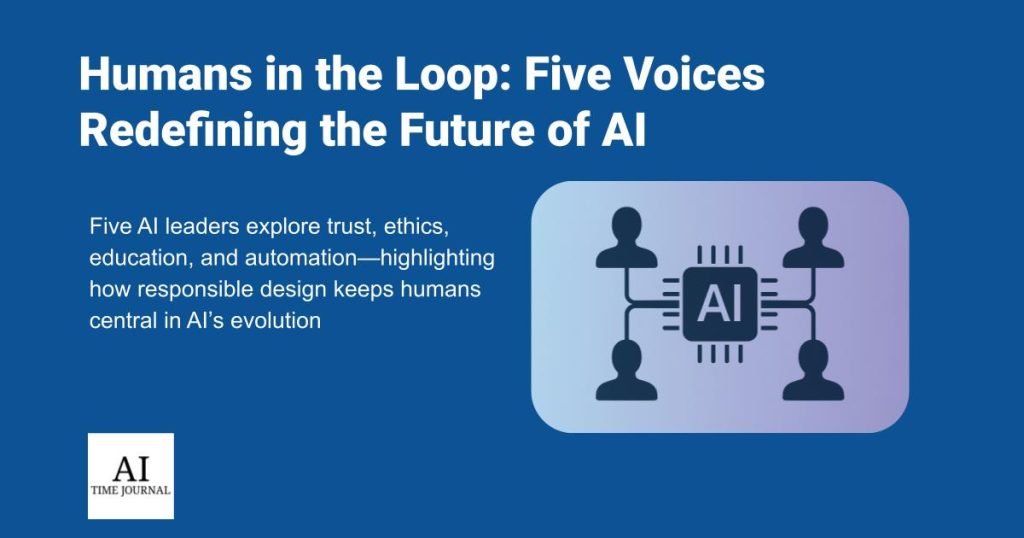
In the public imagination, AI often appears as a machine with glowing eyes, a chess master devoid of emotion, or an invisible brain optimizing everything. But listen closely to the people building it —the researchers, founders, ethicists, and mentors —and a very different picture emerges.
AI isn’t just code. It’s culture, consequence, and conscience. And it’s being shaped, right now, by those who see its promise, but also its peril.
The Humans & AI Show, powered by AI Frontier Network, is a space where this duality is unpacked through real conversations. Not with hype merchants, but with thoughtful leaders grounded in the how, why, and for whom of AI.
From education to automation, trust systems to hybrid workplaces, these five episodes offer a lens into the human blueprint behind the technology, and the values that might keep it on course.
1. Andy Kurtzig — Combining AI with Human Expertise
“You wouldn’t let an AI diagnose your child without a doctor involved, so why let it make decisions about your customers or your future without oversight?”
Andy Kurtzig, CEO of Pearl, begins with a simple premise: AI should enhance human expertise, not replace it. He warns against blind faith in AI’s capabilities, arguing that real-world systems must be designed with built-in checkpoints, human fallback, and radical accessibility.
His vision is one of partnership. AI can scale intelligence, but humans must provide judgment, context, and compassion. That means designing systems that explain themselves and making sure they’re usable by more than just technical elites.
Lesson: Trustworthy AI is not an engineering afterthought; it’s a design mandate.
Relevance: Critical in an era of rapidly scaling AI services across health, law, and customer support.
2. Phil Tomlinson — Human-Centered AI by Design
Phil Tomlinson, SVP at TaskUs, doesn’t just manage AI systems—he cultivates cultures of responsibility around them.
His episode dives deep into the principle of “human-centered AI”: technology that’s transparent, interpretable, and emotionally safe. He argues that design teams must include ethicists, educators, and mental health experts, not just engineers.
“The human experience isn’t a data point. It’s the whole point.”
From gig workers to enterprise clients, Tomlinson’s concern is that AI decisions often affect those who have no seat at the design table. He advocates for systems that are not only accurate, but understandable and fair, especially to the people most impacted.
Lesson: The human element isn’t a variable. It’s the interface.
Relevance: Foundational for AI use in customer experience, content moderation, and HR systems.
3. Doug Stephen — AI in Education, Emotional Intelligence, and the Future of Learning
Doug Stephen, an education executive and futurist, brings something rare to the AI conversation: empathy as a design priority.
He’s not interested in whether AI can grade faster or deliver personalized math worksheets. He wants to know: Can it help humans become more emotionally intelligent? More collaborative? More resilient?
His work shows how AI can support the human development side of learning, augmenting the teacher’s ability to track engagement, motivation, and even stress. In doing so, AI doesn’t replace educators; it amplifies their care.
Lesson: The most powerful AI in education doesn’t just teach, it helps us grow.
Relevance: As AI tools proliferate in classrooms, this episode outlines a roadmap for preserving humanity in digital learning.
4. Adnan Masood — Ethics, Mentorship, and the AI Builder’s Path
Adnan Masood has walked many paths: machine learning architect, mentor, teacher, and ethicist. In this episode, he reflects on AI’s transformative potential and its quiet dangers, bias, exclusion, and misuse.
Masood’s call is to mentor the next generation of AI builders, not just in coding but in wisdom. He stresses community involvement, ethical education, and building systems that can’t just scale, but that should.
“We don’t need more coders. We need more conscious creators.”
Lesson: The future of AI lies not in the tech, but in the values we pass down to its builders.
Relevance: A must-listen for educators, developers, and policymakers shaping AI curricula and company culture.
5. Fabian Veit — Democratizing AI-Powered Automation
Automation, done wrong, feels like erosion, a quiet displacement of meaning and purpose. But Fabian Veit imagines a better path.
In his conversation, Veit explores how AI-driven automation can empower teams, liberate time, and enhance creativity—but only if it’s designed with inclusion and accessibility in mind.
He’s building tools that democratize access to AI, so it doesn’t just benefit big tech but small businesses, NGOs, educators, and workers navigating hybrid realities.
Lesson: Automation must not just increase output, it must increase dignity.
Relevance: Essential for understanding the intersection of AI, labor, and workplace transformation.
Shared Insight: It’s Not Just What We Build, It’s How
Across these five voices, a common theme emerges: Responsible AI is not an outcome. It’s a practice.
- It means starting with humans, not data.
- It means thinking long-term, not just MVP.
- It means teaching, listening, and adapting.
AI is not inevitable. It is intentional. And its trajectory depends on whether we are willing to build with conscience, not just ambition.
Start Listening, Start Leading
These episodes don’t just spotlight problems; they offer principled blueprints for doing AI right. In a world rushing toward automation, they remind us: the future of AI is not about machines. It’s about us.
Explore the full series at aifn.co/humans-in-ai-show


